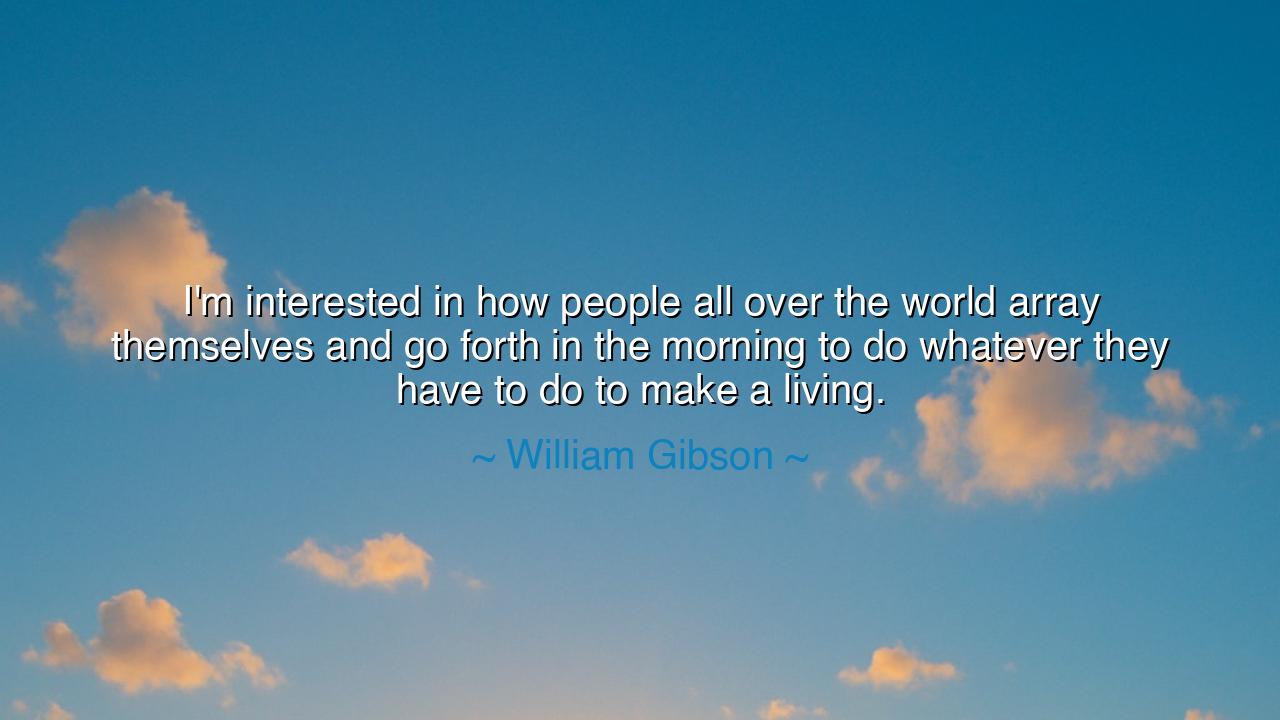
I'm interested in how people all over the world array themselves
I'm interested in how people all over the world array themselves and go forth in the morning to do whatever they have to do to make a living.






When William Gibson declared, “I’m interested in how people all over the world array themselves and go forth in the morning to do whatever they have to do to make a living,” he spoke as one who peers not only into the future, but also into the daily rituals that bind all of humanity together. These words are deceptively simple, yet within them lies a great vision: the recognition that life, in all its vastness and diversity, is united by the shared act of rising each day to labor, to strive, and to endure. The morning is not just an hour of light; it is the stage upon which billions prepare themselves for the trials of existence.
In this, Gibson reminds us that every person—whether in the bustling streets of a city or the quiet fields of a village—performs a sacred rite of preparation. Some don uniforms, others sharpen tools, still others gather their courage for tasks unseen. To “array themselves” is to arm oneself for the battles of the day, whether those battles are of commerce, of survival, of creation, or of service. The ritual is universal, a thread that binds humanity together, and Gibson, the visionary of cyberpunk worlds, finds fascination in this most ancient of rhythms: the morning march toward necessity.
The ancients, too, recognized this truth. The Romans began each day with the clang of the forum, where merchants displayed their goods and senators assembled for debate. The farmers of Greece rose with the sun, shouldering their plows as though they were weapons in a war against hunger. And in the East, scholars gathered at dawn to copy texts by hand, ensuring that wisdom endured through centuries. All of them, though separated by lands and cultures, shared the same act of going forth to make a living, giving form to the eternal truth that labor is the common bond of mankind.
History gives us vivid examples. Consider the Japanese workers of the Meiji era, who in the late 19th century transformed their nation through discipline and innovation. Each morning, they arrayed themselves in humble garments, walked into factories, and through their collective toil remade Japan into a modern power. Their daily rising was not grand in appearance, yet in its repetition, it became heroic. From their ordinary routines sprang an extraordinary transformation of a nation. Gibson’s words remind us that what seems mundane at the individual level may, in truth, shape the destiny of civilizations.
There is a deeper, more spiritual meaning as well. To labor is not merely to survive—it is to participate in the grand design of existence. When a man or woman awakens, dresses, and steps forth into the world to work, they declare silently: “I will not surrender to idleness; I will engage with life.” It is an affirmation of purpose. Gibson, in his fascination, does not marvel at wealth or glory, but at the very act of rising to face necessity. For therein lies the dignity of humanity: not in avoiding struggle, but in answering it each dawn.
The lesson is clear: honor the daily rituals of life, both in yourself and in others. Do not despise the common labors—the bus driver’s route, the farmer’s harvest, the mother’s care, the clerk’s counting—for these are the pillars upon which society stands. Each person you meet has arrayed themselves that morning, armed with courage or weariness, to walk into the demands of the day. To recognize this is to cultivate compassion and respect, knowing that every life is engaged in its own quiet battle for survival and meaning.
Practically, let us learn to approach our own mornings with intention. Rise not in haste or bitterness, but with reverence for the task of living. Prepare yourself as though you, too, are arraying for battle—not only with clothing, but with courage, focus, and gratitude. And when you see others arrayed for their own journey, honor their effort, for in that recognition lies community.
Thus Gibson’s words, though rooted in observation, become a teaching for all generations: that the morning march of humanity, repeated endlessly across the globe, is not to be taken lightly. It is the living heartbeat of civilization. Each dawn, billions rise and step forth, and in their going forth, the world itself is built anew.






AAdministratorAdministrator
Welcome, honored guests. Please leave a comment, we will respond soon